Business Law Report: Employment Rights and Tribunals
VerifiedAdded on 2023/01/12
|6
|1283
|86
Report
AI Summary
This report provides a comprehensive analysis of employment rights and tribunals, focusing on the importance of employee rights within organizations. It explores key legislation such as minimum wage, health and safety regulations, and anti-discrimination laws, emphasizing their significance in fostering a fair and productive work environment. The report also examines the role of Employment Tribunals (ETs) in the UK, detailing their functions in resolving workplace disputes, including cases of unfair dismissal and discrimination. It highlights the evolving nature of employment legislation and the challenges faced by companies in enforcing these rights. Furthermore, the report references relevant academic sources and government resources to support its findings, offering a well-rounded understanding of the subject matter. The conclusion summarizes the key takeaways, reinforcing the need for businesses to prioritize employee rights and comply with employment laws to ensure a harmonious and legally sound workplace.

Report
Paraphrase This Document
Need a fresh take? Get an instant paraphrase of this document with our AI Paraphraser
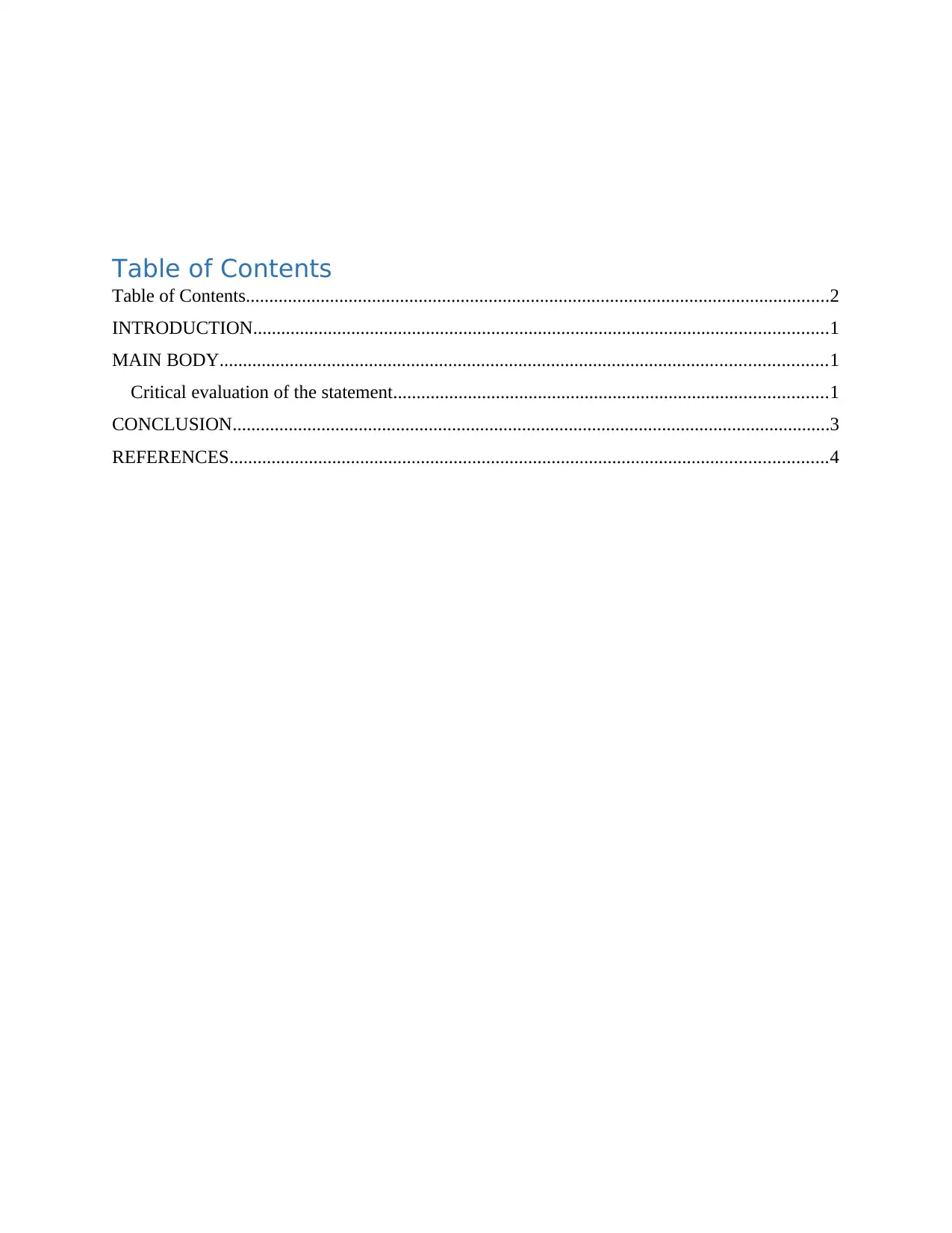
Table of Contents
Table of Contents.............................................................................................................................2
INTRODUCTION...........................................................................................................................1
MAIN BODY..................................................................................................................................1
Critical evaluation of the statement.............................................................................................1
CONCLUSION................................................................................................................................3
REFERENCES................................................................................................................................4
Table of Contents.............................................................................................................................2
INTRODUCTION...........................................................................................................................1
MAIN BODY..................................................................................................................................1
Critical evaluation of the statement.............................................................................................1
CONCLUSION................................................................................................................................3
REFERENCES................................................................................................................................4
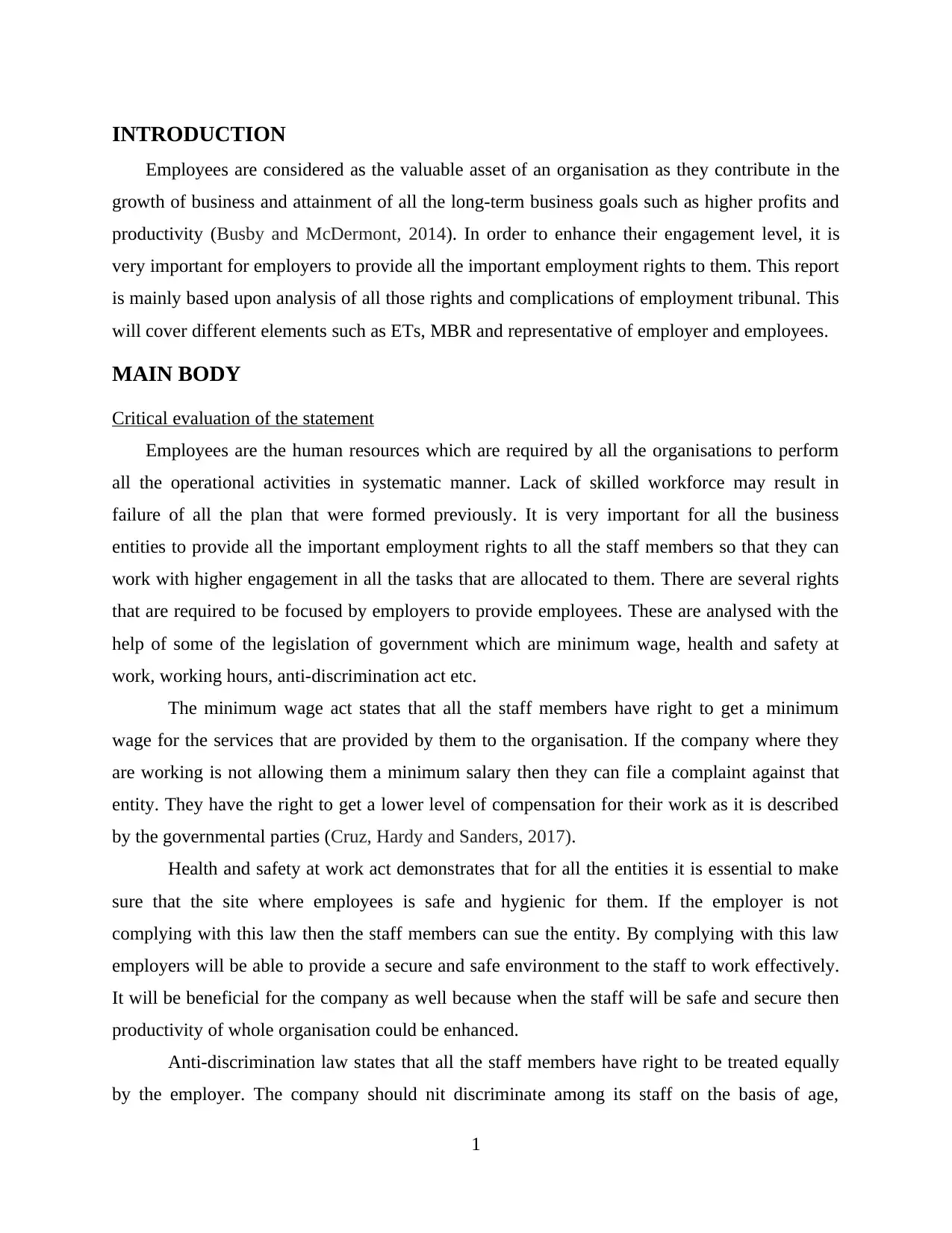
INTRODUCTION
Employees are considered as the valuable asset of an organisation as they contribute in the
growth of business and attainment of all the long-term business goals such as higher profits and
productivity (Busby and McDermont, 2014). In order to enhance their engagement level, it is
very important for employers to provide all the important employment rights to them. This report
is mainly based upon analysis of all those rights and complications of employment tribunal. This
will cover different elements such as ETs, MBR and representative of employer and employees.
MAIN BODY
Critical evaluation of the statement
Employees are the human resources which are required by all the organisations to perform
all the operational activities in systematic manner. Lack of skilled workforce may result in
failure of all the plan that were formed previously. It is very important for all the business
entities to provide all the important employment rights to all the staff members so that they can
work with higher engagement in all the tasks that are allocated to them. There are several rights
that are required to be focused by employers to provide employees. These are analysed with the
help of some of the legislation of government which are minimum wage, health and safety at
work, working hours, anti-discrimination act etc.
The minimum wage act states that all the staff members have right to get a minimum
wage for the services that are provided by them to the organisation. If the company where they
are working is not allowing them a minimum salary then they can file a complaint against that
entity. They have the right to get a lower level of compensation for their work as it is described
by the governmental parties (Cruz, Hardy and Sanders, 2017).
Health and safety at work act demonstrates that for all the entities it is essential to make
sure that the site where employees is safe and hygienic for them. If the employer is not
complying with this law then the staff members can sue the entity. By complying with this law
employers will be able to provide a secure and safe environment to the staff to work effectively.
It will be beneficial for the company as well because when the staff will be safe and secure then
productivity of whole organisation could be enhanced.
Anti-discrimination law states that all the staff members have right to be treated equally
by the employer. The company should nit discriminate among its staff on the basis of age,
1
Employees are considered as the valuable asset of an organisation as they contribute in the
growth of business and attainment of all the long-term business goals such as higher profits and
productivity (Busby and McDermont, 2014). In order to enhance their engagement level, it is
very important for employers to provide all the important employment rights to them. This report
is mainly based upon analysis of all those rights and complications of employment tribunal. This
will cover different elements such as ETs, MBR and representative of employer and employees.
MAIN BODY
Critical evaluation of the statement
Employees are the human resources which are required by all the organisations to perform
all the operational activities in systematic manner. Lack of skilled workforce may result in
failure of all the plan that were formed previously. It is very important for all the business
entities to provide all the important employment rights to all the staff members so that they can
work with higher engagement in all the tasks that are allocated to them. There are several rights
that are required to be focused by employers to provide employees. These are analysed with the
help of some of the legislation of government which are minimum wage, health and safety at
work, working hours, anti-discrimination act etc.
The minimum wage act states that all the staff members have right to get a minimum
wage for the services that are provided by them to the organisation. If the company where they
are working is not allowing them a minimum salary then they can file a complaint against that
entity. They have the right to get a lower level of compensation for their work as it is described
by the governmental parties (Cruz, Hardy and Sanders, 2017).
Health and safety at work act demonstrates that for all the entities it is essential to make
sure that the site where employees is safe and hygienic for them. If the employer is not
complying with this law then the staff members can sue the entity. By complying with this law
employers will be able to provide a secure and safe environment to the staff to work effectively.
It will be beneficial for the company as well because when the staff will be safe and secure then
productivity of whole organisation could be enhanced.
Anti-discrimination law states that all the staff members have right to be treated equally
by the employer. The company should nit discriminate among its staff on the basis of age,
1
⊘ This is a preview!⊘
Do you want full access?
Subscribe today to unlock all pages.

Trusted by 1+ million students worldwide
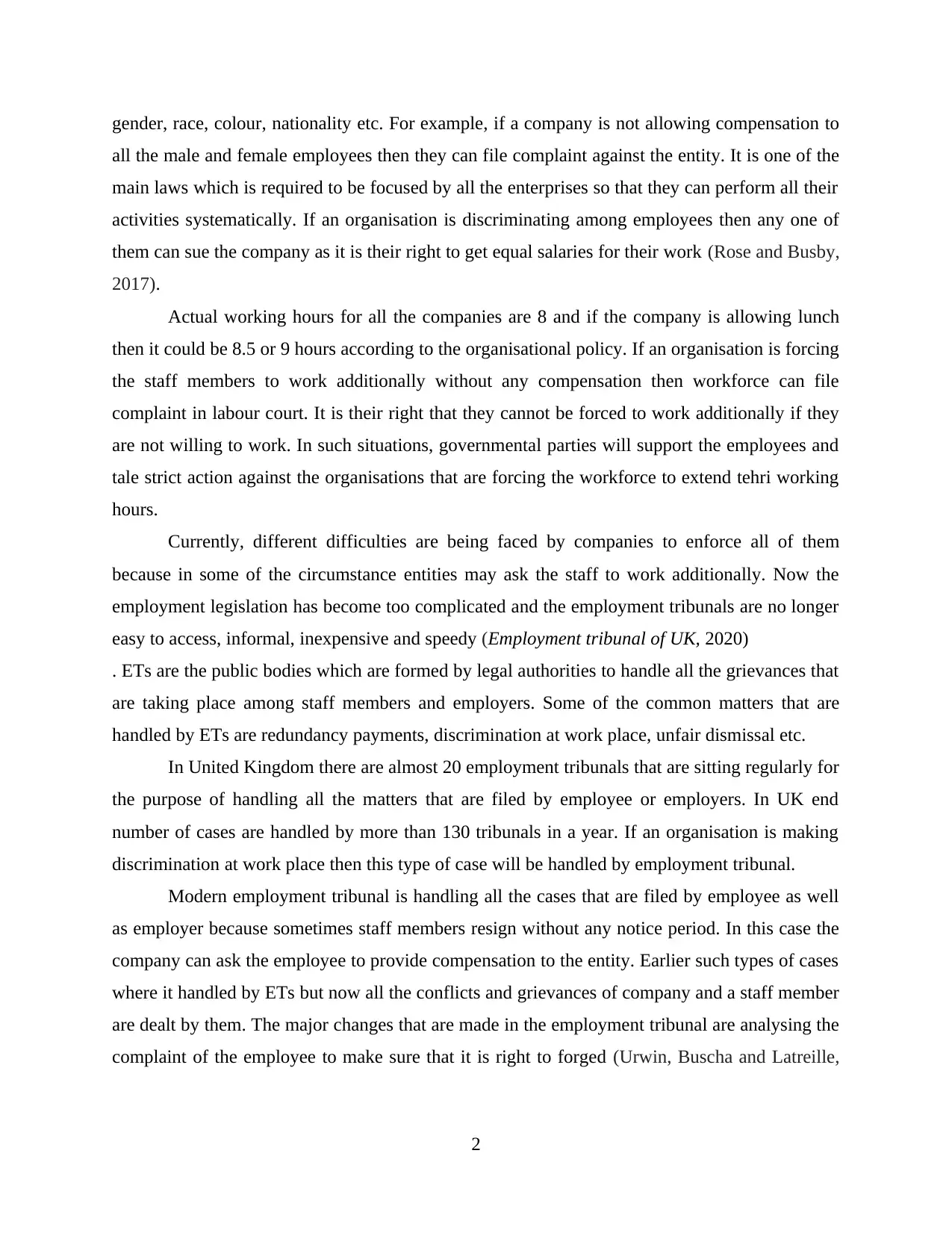
gender, race, colour, nationality etc. For example, if a company is not allowing compensation to
all the male and female employees then they can file complaint against the entity. It is one of the
main laws which is required to be focused by all the enterprises so that they can perform all their
activities systematically. If an organisation is discriminating among employees then any one of
them can sue the company as it is their right to get equal salaries for their work (Rose and Busby,
2017).
Actual working hours for all the companies are 8 and if the company is allowing lunch
then it could be 8.5 or 9 hours according to the organisational policy. If an organisation is forcing
the staff members to work additionally without any compensation then workforce can file
complaint in labour court. It is their right that they cannot be forced to work additionally if they
are not willing to work. In such situations, governmental parties will support the employees and
tale strict action against the organisations that are forcing the workforce to extend tehri working
hours.
Currently, different difficulties are being faced by companies to enforce all of them
because in some of the circumstance entities may ask the staff to work additionally. Now the
employment legislation has become too complicated and the employment tribunals are no longer
easy to access, informal, inexpensive and speedy (Employment tribunal of UK, 2020)
. ETs are the public bodies which are formed by legal authorities to handle all the grievances that
are taking place among staff members and employers. Some of the common matters that are
handled by ETs are redundancy payments, discrimination at work place, unfair dismissal etc.
In United Kingdom there are almost 20 employment tribunals that are sitting regularly for
the purpose of handling all the matters that are filed by employee or employers. In UK end
number of cases are handled by more than 130 tribunals in a year. If an organisation is making
discrimination at work place then this type of case will be handled by employment tribunal.
Modern employment tribunal is handling all the cases that are filed by employee as well
as employer because sometimes staff members resign without any notice period. In this case the
company can ask the employee to provide compensation to the entity. Earlier such types of cases
where it handled by ETs but now all the conflicts and grievances of company and a staff member
are dealt by them. The major changes that are made in the employment tribunal are analysing the
complaint of the employee to make sure that it is right to forged (Urwin, Buscha and Latreille,
2
all the male and female employees then they can file complaint against the entity. It is one of the
main laws which is required to be focused by all the enterprises so that they can perform all their
activities systematically. If an organisation is discriminating among employees then any one of
them can sue the company as it is their right to get equal salaries for their work (Rose and Busby,
2017).
Actual working hours for all the companies are 8 and if the company is allowing lunch
then it could be 8.5 or 9 hours according to the organisational policy. If an organisation is forcing
the staff members to work additionally without any compensation then workforce can file
complaint in labour court. It is their right that they cannot be forced to work additionally if they
are not willing to work. In such situations, governmental parties will support the employees and
tale strict action against the organisations that are forcing the workforce to extend tehri working
hours.
Currently, different difficulties are being faced by companies to enforce all of them
because in some of the circumstance entities may ask the staff to work additionally. Now the
employment legislation has become too complicated and the employment tribunals are no longer
easy to access, informal, inexpensive and speedy (Employment tribunal of UK, 2020)
. ETs are the public bodies which are formed by legal authorities to handle all the grievances that
are taking place among staff members and employers. Some of the common matters that are
handled by ETs are redundancy payments, discrimination at work place, unfair dismissal etc.
In United Kingdom there are almost 20 employment tribunals that are sitting regularly for
the purpose of handling all the matters that are filed by employee or employers. In UK end
number of cases are handled by more than 130 tribunals in a year. If an organisation is making
discrimination at work place then this type of case will be handled by employment tribunal.
Modern employment tribunal is handling all the cases that are filed by employee as well
as employer because sometimes staff members resign without any notice period. In this case the
company can ask the employee to provide compensation to the entity. Earlier such types of cases
where it handled by ETs but now all the conflicts and grievances of company and a staff member
are dealt by them. The major changes that are made in the employment tribunal are analysing the
complaint of the employee to make sure that it is right to forged (Urwin, Buscha and Latreille,
2
Paraphrase This Document
Need a fresh take? Get an instant paraphrase of this document with our AI Paraphraser
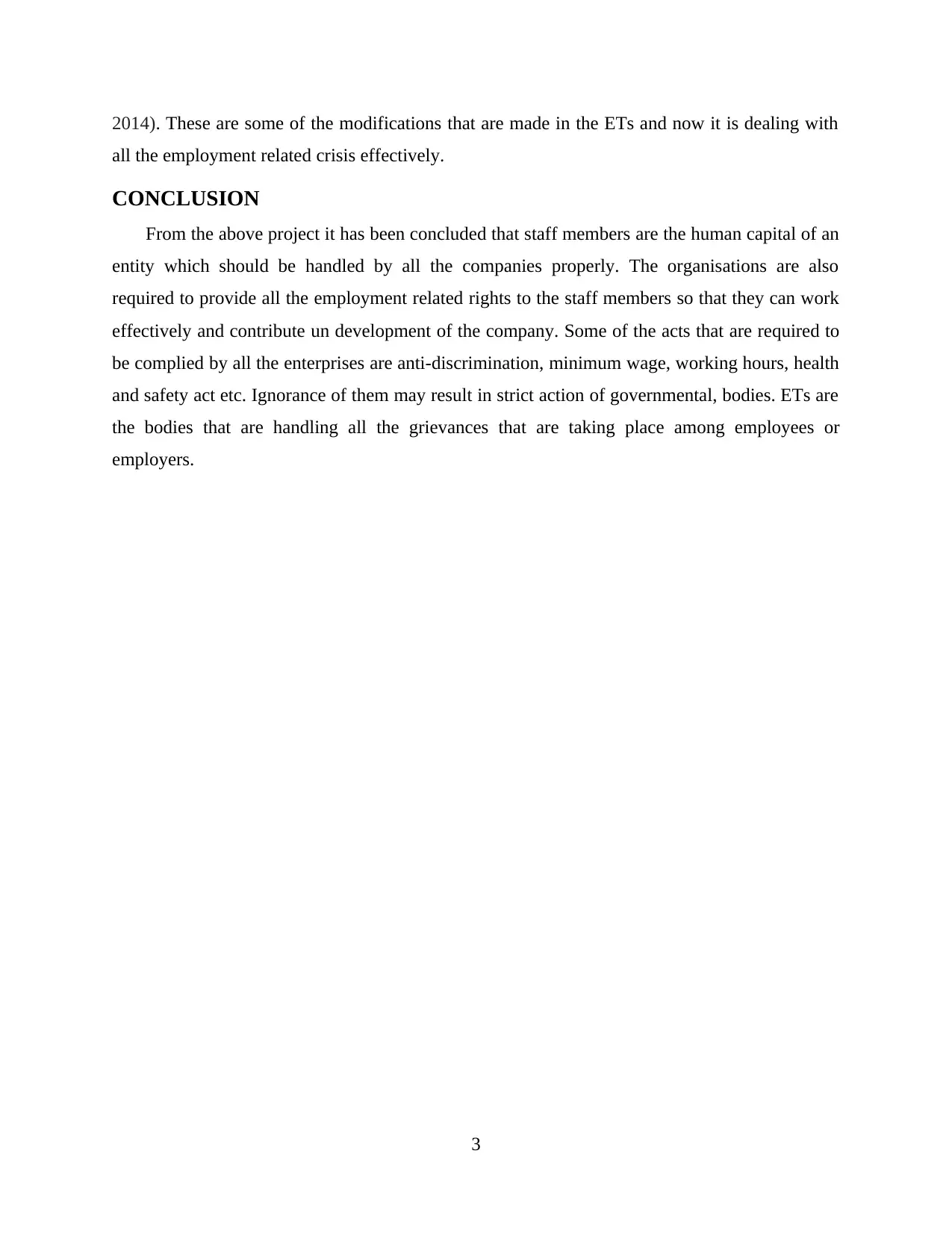
2014). These are some of the modifications that are made in the ETs and now it is dealing with
all the employment related crisis effectively.
CONCLUSION
From the above project it has been concluded that staff members are the human capital of an
entity which should be handled by all the companies properly. The organisations are also
required to provide all the employment related rights to the staff members so that they can work
effectively and contribute un development of the company. Some of the acts that are required to
be complied by all the enterprises are anti-discrimination, minimum wage, working hours, health
and safety act etc. Ignorance of them may result in strict action of governmental, bodies. ETs are
the bodies that are handling all the grievances that are taking place among employees or
employers.
3
all the employment related crisis effectively.
CONCLUSION
From the above project it has been concluded that staff members are the human capital of an
entity which should be handled by all the companies properly. The organisations are also
required to provide all the employment related rights to the staff members so that they can work
effectively and contribute un development of the company. Some of the acts that are required to
be complied by all the enterprises are anti-discrimination, minimum wage, working hours, health
and safety act etc. Ignorance of them may result in strict action of governmental, bodies. ETs are
the bodies that are handling all the grievances that are taking place among employees or
employers.
3
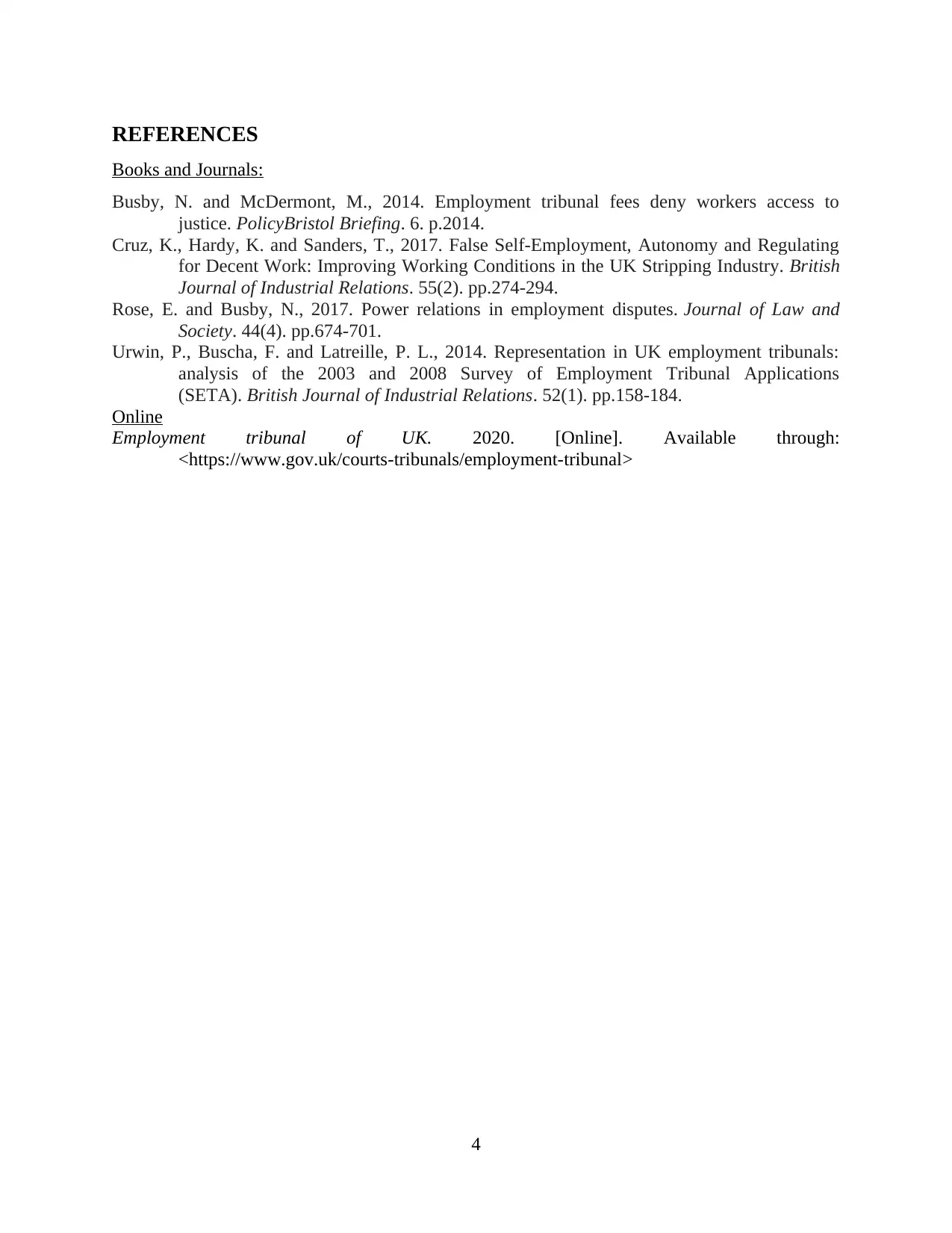
REFERENCES
Books and Journals:
Busby, N. and McDermont, M., 2014. Employment tribunal fees deny workers access to
justice. PolicyBristol Briefing. 6. p.2014.
Cruz, K., Hardy, K. and Sanders, T., 2017. False Self‐Employment, Autonomy and Regulating
for Decent Work: Improving Working Conditions in the UK Stripping Industry. British
Journal of Industrial Relations. 55(2). pp.274-294.
Rose, E. and Busby, N., 2017. Power relations in employment disputes. Journal of Law and
Society. 44(4). pp.674-701.
Urwin, P., Buscha, F. and Latreille, P. L., 2014. Representation in UK employment tribunals:
analysis of the 2003 and 2008 Survey of Employment Tribunal Applications
(SETA). British Journal of Industrial Relations. 52(1). pp.158-184.
Online
Employment tribunal of UK. 2020. [Online]. Available through:
<https://www.gov.uk/courts-tribunals/employment-tribunal>
4
Books and Journals:
Busby, N. and McDermont, M., 2014. Employment tribunal fees deny workers access to
justice. PolicyBristol Briefing. 6. p.2014.
Cruz, K., Hardy, K. and Sanders, T., 2017. False Self‐Employment, Autonomy and Regulating
for Decent Work: Improving Working Conditions in the UK Stripping Industry. British
Journal of Industrial Relations. 55(2). pp.274-294.
Rose, E. and Busby, N., 2017. Power relations in employment disputes. Journal of Law and
Society. 44(4). pp.674-701.
Urwin, P., Buscha, F. and Latreille, P. L., 2014. Representation in UK employment tribunals:
analysis of the 2003 and 2008 Survey of Employment Tribunal Applications
(SETA). British Journal of Industrial Relations. 52(1). pp.158-184.
Online
Employment tribunal of UK. 2020. [Online]. Available through:
<https://www.gov.uk/courts-tribunals/employment-tribunal>
4
⊘ This is a preview!⊘
Do you want full access?
Subscribe today to unlock all pages.

Trusted by 1+ million students worldwide
1 out of 6
Related Documents
Your All-in-One AI-Powered Toolkit for Academic Success.
+13062052269
info@desklib.com
Available 24*7 on WhatsApp / Email
![[object Object]](/_next/static/media/star-bottom.7253800d.svg)
Unlock your academic potential
Copyright © 2020–2025 A2Z Services. All Rights Reserved. Developed and managed by ZUCOL.




